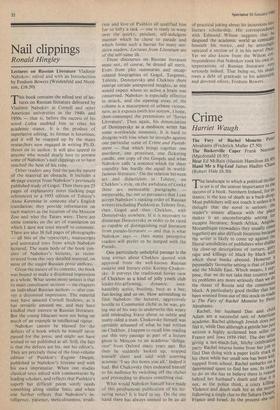Nail clippings
Ronald Hingley
This book contains the edited text of lec- tures on Russian literature delivered by Vladimir Nabokov at Cornell and other American universities in the 1940s and 1950s — that is, before the success of his novel Loiita enabled him to relax his academic stance. It is the product of superlative editing, its format is luxurious, and it will be snapped up by the many researchers now engaged in writing Ph.D. theses on its author. It will also appeal to anyone who would dearly love to possess some of Nabokov's nail clippings or to have touched the hem of his robe.
Other readers amy find the patchy nature of the material an obstacle. It includes a 46-page excerpt from Nabokov's previously published study of Gogol. Then there are 25 pages of explanatory notes (lacking page references) to a 1935 edition of Tolstoy's Anna Karenina in someone else's English translation; they provide information on such matters as the location of the Moscow Zoo and who the Tatars were. There are some remarks on the art of translation on which I dare not trust myself to comment. There are also 38 full pages of photographs — all bits of the typescripts, manuscripts and annotated texts from which Nabokov lectured. The main body of the book con- sists of Nabokov's lectures, as recon- structed from this very detailed material, on most of the major Russian prose authors.
Given the nature of its contents, the book was bound to make a disjointed impression as a whole. What seems more serious is that its mai n constituent sect ions — the chapters on individual Russian authors — also con- vey a disjointed impression. The material may have amused Cornell Students, as it has certainly amused me, and may have kindled their interest in Russian literature. But the young Ithacans were not being set much of an example in intellectual rigour.
Nabokov cannot be blamed for the defects of a book which he himself never passed for the press, and might not have wished to see published at all. Still, the fact is that the defects are his, not his editor's. They are precisely those of the. four-volume edition of Pushkin's Eugene Onegin, published in Nabokov's lifetime and with his own imprimatur. When one studies classical texts edited with commentaries by leading scholars, and reflects that Pushkin's superb but difficult poem sorely needs something along similar lines; and when one further reflects that Nabokov's in- telligence, patience, meticulousness, erudi- tion and love of Pushkin all qualified him for so lofty a task — one is ready to weep over the quirky, petulant, self-indulgent manner which he chose to parade and which forms such a barrier for many sen- sitive readers. Lectures from Literature are of the self-same ilk.
These discourses on Russian literature must not, of course, be denied all merit. Even from plot summaries and encap- sulated biographies of Gogol, Turgenev, Tolstoy, Dostoyevsky and Chekhov there emerge certain unexpected insights, as one would expect where so active a brain was concerned. Nabokov is especially effective in attack, and the opening essay of the volume is a masterpiece of urbane vicious- ness, as it exposes (with less sorrow, I hope, than contempt) the pretensions of 'Soviet Literature'. Then again, his denunciation of Dostoyevsky as a mediocre writer has some worthwhile moments. It is hard to disagree with him when he inveighs against one particular scene of Crime and Punish- ment — that which brings together one murderer, one prostitute, one flickering candle, one copy of the Gospels and what Nabokov calls 'a sentence which for sheer stupidity has hardly the equal in world- famous literature.' On the relation between art and didacticism in Tolstoy, on Chekhov's style, on the awfulness of Gorky these are memorable paragraphs memorable, but not so persuasive that 1 can accept Nabokov's ranking order of Russian writers (excluding Pushkin) as Tolstoy first, then Gogol and then Chekhov, with Dostoyevsky nowhere. If it is necessary to disparage Dostoyevsky in order to be rated as capable of distinguishing real literature from pseudo-literature — and that is what Nabokov says — then many perceptive readers will prefer to be lumped with the Pseuds.
One particularly unhelpful passage is the long extract about Chekhov quoted with approval from the well-known Russian essayist and literary critic Korney Chukov- sky. It purveys the traditional Soviet view of Chekhov as a kind of jolly youth club
leader-life-affirming, dynamic, inex- haustibly active, bustling, busy as a bee, fun-loving and so on. How astonishing to find Nabokov the lecturer, aggressively hostile to Communist cliche as he was, go- ing out of his way to underwrite this weary and misleading litany about so subtle and many-sided a man. Chukovsky himself was certainly ashamed of what he had written on Chekhov. I happen to recall him reading out this very passage as part of a lecture given in Moscow to an academic 'delega- tion' from Oxford many years ago. But then he suddenly looked up, stopped himself short and said with unerring acumen: 'I see this bores you all.' Indeed it had. But Chukovsky then endeared himself to his audience by switching off the cliches and proceeding to discuss something real.
What would Nabokov himself have made of this posthumous publication of his lec- turing notes? It is hard to say. On the one hand there has always seemed to be an air
of practical joking about his incursions into literary scholarship. His correspondence with Edmund Wilson suggests that be despised the academic world as comically beneath his notice, and he amusingly satirized a section of it in his novel Piun' Yet we also know from the Wilson cor- respondence that Nabokov took his own la' terpretations of Russian literature very seriously indeed. That being so, his shade owes a debt of gratitude to his admirable and devoted editor, Fredson Bowers.


































 Previous page
Previous page